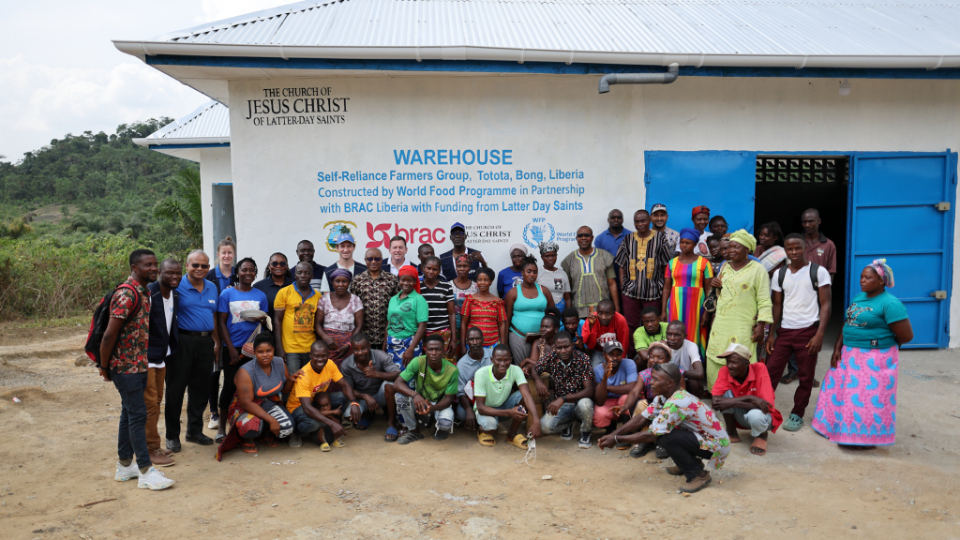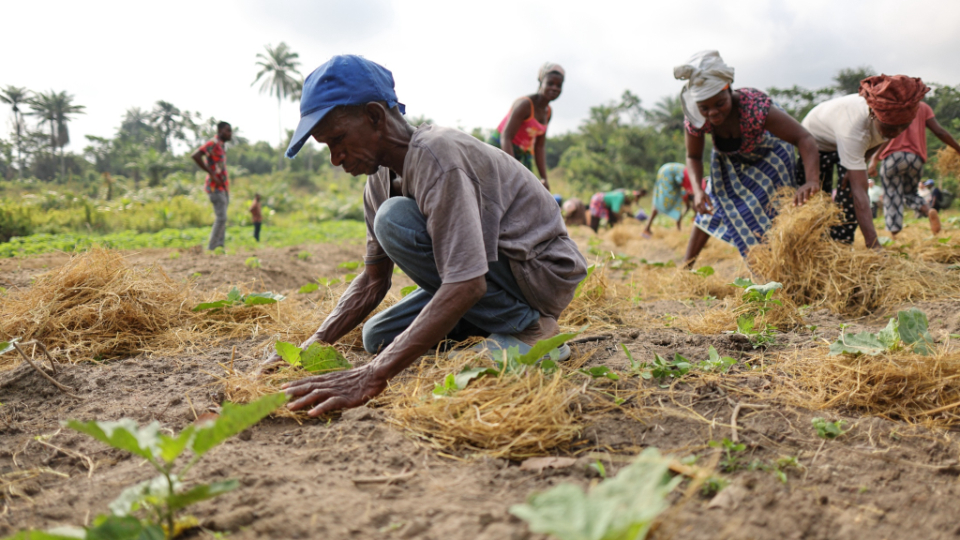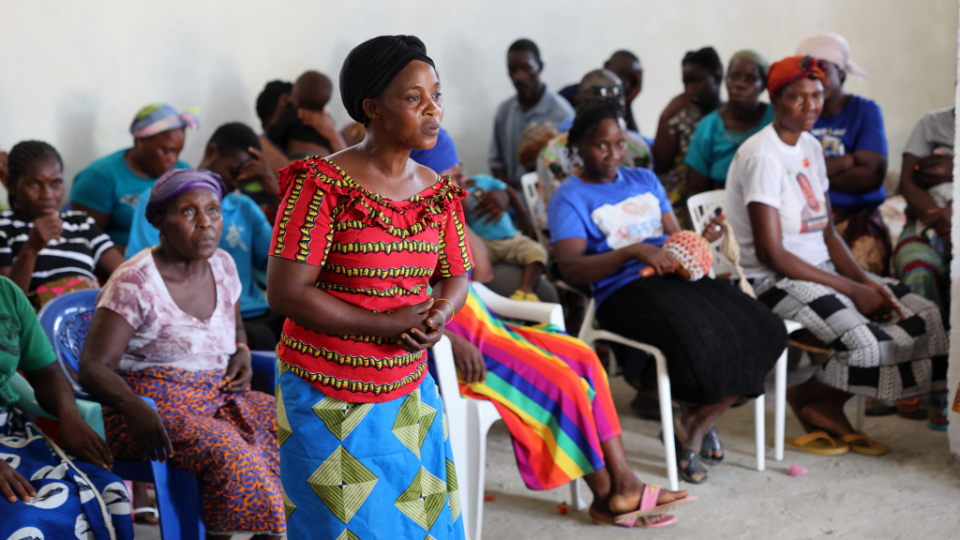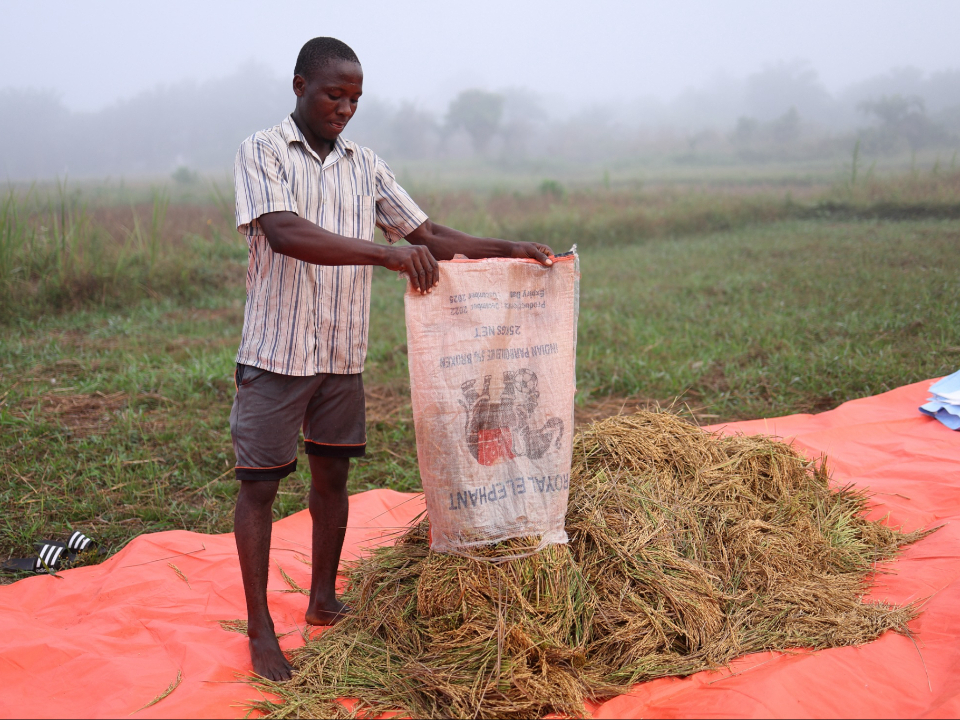
WFP-Liberia-AgriBusiness-Center-3
The self-reliance farmers group, many of them Latter-day Saints, gather outside a warehouse in Totota, Liberia, on Thursday, January 18, 2024.2024 by Intellectual Reserve, Inc. All rights reserved.This story appears here courtesy of TheChurchNews.com. It is not for use by other media.
By Mary Richards, Church News
In Liberia, nearly 84% of families live on less than $1.25 a day, and 47% of households are food insecure.
But efforts from The Church of Jesus Christ of Latter-day Saints are helping families improve their own situations as they build self-reliance.
The Church is working with the United Nations World Food Programme (WFP) and BRAC Liberia on various initiatives in the country — like training programs, farmers cooperatives and agri-business centers.
BRAC has been working in Liberia since 2008. The international non-governmental organization strives to alleviate multidimensional poverty through helping marginalized communities reach their potential and increase self-reliance.
In a project supported by BRAC, the WFP and the Church, farmers were trained in agricultural best practices in lowland rice/paddy production, climate smart agriculture, financial literacy, best agriculture practices in vegetable production, post-harvest handling, cassava production, corn production and income-generating activities in poultry and livestock.
One technique, for example, involves putting grasses from rice leaves around a plant as a mulch or soil cover — helping fertilize, retain moisture and protect the plant.

WFP-Liberia-Fields-10
A farmer places dried rice stalks as mulch around the community vegetable garden in Gbarnga, Liberia, on Friday, January 19, 2024.2024 by Intellectual Reserve, Inc. All rights reserved.Habibur Rahman Khan, BRAC Liberia’s program manager for Agriculture, Food Security and Livelihood, said the project began at a time where “hunger was at its peak” in the country. People were working for others to get money to buy food or they worked for food for their families. Everything they earned went toward feeding the household.
“The training empowered the farmers to increase their production and properly manage their crops. They are now able to harvest, process and store their own seeds for production,” Khan wrote to the Church News.
The participants were able to cope with the seasonal shock of hunger and their nutrition improved. They learned how to reduce post-harvest losses, thus increasing their profits.
As they gained more income, their status in society improved. Families were able to start putting their income toward other things besides only food — and children are now attending school more regularly.
“The Church of Jesus Christ of Latter-day Saints has supported our effort to support farmers who are in the state of extreme poverty to some extent have some level of improvement in their lives by building their resilience against shock,” Khan said. “And gave them some level of dignity and voice in decision making — particularly the women.”

WFP-Liberia-AgriBusiness-Center-4
Woman co-op member expresses gratitude for the World Food Programme, BRAC Liberia and The Church of Jesus Christ of Latter-day Saints for helping and funding the setup of their self-reliance farmers group in Totota, Liberia, on Thursday, January 18, 2024.2024 by Intellectual Reserve, Inc. All rights reserved.The construction of a well-equipped and functional agri-business center and warehouse further built their resilience. With this equipment, farmers will be able to mechanize their farms and thereby increase their farm size and reduce their work on the farm.
“These facilities will also reduce post-harvest losses during harvesting, transporting, processing and storage,” Khan said. “The facility will also serve a marketing center for a better marketing of their products, which will offer them better prices. The facility will also serve as a revenue generation source for farmers and will also serve as social cohesion and capacity building center for them.”
The Importance of Self-Reliance
Khan said that when someone is able to build self-reliance and resilience, they have more power to cope with shocks or disruptions in their life — such as seasonal, weather or health challenges.
“It helps the person to move forward in life and enables that person to maintain good health and overall wellbeing. It restores lost dignity in a person’s life and helps them leave from poverty to an improved life,” Khan said.
With Church funding, the World Food Programme has been supporting several smallholder farmers cooperatives — in which the farmers develop the land, grow more food and work as a group to generate more income.
This work together supports farmer cooperatives that help farmers become more self-sufficient by providing agricultural production training and helping them develop land. It also supports home-grown school feeding programs.
The goal is to create a foundation of self-reliance for the farmers so they won’t need the funding from the Church or World Food Programme any more.

WFP-Liberia-Fields-3
Harvested rice is quickly gathered and preserved to reduce post-harvest losses by 80% due to spoilage. Photo taken in Gbarnga, Liberia on Friday, January 19, 2024. 2024 by Intellectual Reserve, Inc. All rights reserved.WFP is the world’s largest humanitarian organization, and it received $32 million from the Church in 2022 in what was the Church’s largest one-time donation to date.
In January, leaders from WFP and the Church’s Africa West Area spent several days in the country viewing their joint efforts at schools and farms.
Martin George is a farmer in Gbarnga, Liberia, benefiting from the Church’s support.
“There is no more hunger in my house because the community, everybody, works together,” George said. “I’m so happy because I have food in my house. When you have food, you are a happy man.”
Copyright 2024 Deseret News Publishing Company.